by Rona | Oct 17, 2018 | Announcements, Appearances, KPFA, Podcasts, Radio Shows
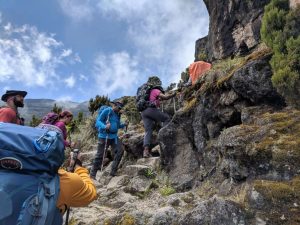
People experience therapeutic benefits when immersed in nature. Research shows that spending significant time in nature can lead to better immunity, reduced anger, better mood, good sleep, and increased energy. Spending time in nature also reduces blood pressure, heart rate, muscle tension, and the production of stress hormones. In partnership with the East Bay Regional Park District, the Primary Care Clinic at UCSF Benioff Children’s Hospital Oakland became one of the first in the nation to refer patients to the outdoors for health. The program is called Stay Healthy In Nature Everyday (SHINE).
There are now many doctors prescribing Nature for its health benefits. Ask your doctor about it!
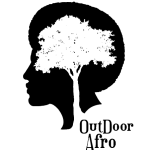 (Picture from Outdoor Afro)
(Picture from Outdoor Afro)
Listen to todays show on KPFA 94.1FM (10/22)
Guests:
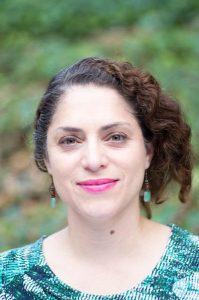
Nooshin Razani, MD, MPH, is a pediatric clinical scientist and Nature Champion. She serves as director of the Center for Nature and Health at UCSF Benioff Children’s Hospital Oakland, and she founded the Stay Healthy In Nature Everyday (SHINE) program. She is leading a team of clinicians conducting a randomized clinical trial to examine how to operationalize a park prescription program in a low-income setting. Since 2014, Dr. Razani has prescribed time outdoors to her pediatric patients and their families as preventive medicine. The results of the first study showed reduced stress in the parents of pediatric patients at a clinic serving low-income families. The randomized clinical trial is the first of its kind. It compared the effect of supported park outings versus independent park prescriptions with the goal of learning how to operationalize a park prescription program in a low-income setting. She was trained as a Nature Champion by the National Environmental Education Fund and Bureau of Fish and Wildlife in 2010. Dr. Razani is an attending physician UCSF Benioff Oakland’s Ambulatory Department and Assistant Clinical Scientist at Children’s Hospital Oakland Research Institute (CHORI).She attended medical school at University of California San Francisco, completed a pediatric residency at UCSF Benioff Children’s Hospital Oakland, and has a Masters in Public Health from the Harvard School of Public Health.
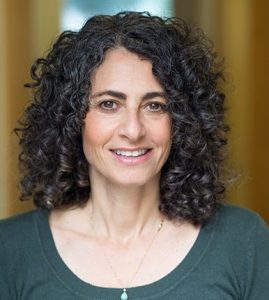
Daphne Miller, MD founded WholeFamily MD, San Francisco’s first integrative primary care medical practice. Her mission was to reclaim the heart of medicine by focusing on her patients rather than on the business and red tape of medical practice. Dr. Miller welcomes the challenge of medical mysteries and enjoys helping patients tackle complex health problems. She feels her most important role is to help patients discover their “inner doctor,” so that they may develop the skills they need to manage their health. Dr. Miller is a graduate of Brown University and Harvard Medical School and completed her family medicine residency and an NIH-funded primary care research fellowship at UCSF. She is also a Bravewell Fellow with the University of Arizona Program in Integrative Medicine. Dr. Miller is an Associate Professor at UCSF where she teaches nutrition and integrative medicine. When she is not seeing patients or teaching, Dr. Miller writes books and articles related to food, farming, the environment, and health. She has authored two best-selling books: The Jungle Effect: The Healthiest Diets from Around the World, Why They Work and How to Make Them Work for You and Farmacology: Total Health from the Ground Up.
by Rona | Sep 12, 2018 | Announcements, Appearances, KPFA, Podcasts, Radio Shows
Listen now to the show we did on 9/17/18, on About Health on KPFA.org, 94.1FM

If you suffer from chronic pain, you are not alone. It’s been reported that 100 million people in the US suffer from chronic pain, and 66% of sufferers expect to live with some pain for the rest of their lives. Many people with chronic pain feel isolated, and need friends, family, or counselors, to help them cope with the many emotions that come with ongoing pain. Aside from medication treatment, there are many other strategies people find helpful in managing their pain, and we will talk with our listeners about what has helped them. We will also discuss the stigma associated with people who have chronic pain, and what kinds of things can relieve that burden.
Guests:
Marsha Haller, MD did her residency training at San Francisco General Hospital/UCSF in Psychiatry and Family Medicine. She also completed a fellowship in Urban Family Health, and the Geriatric Teaching Program at Mt Sinai Hospital. Dr. Haller was board certified in Geriatric Medicine in 1990. During her academic career, she developed courses on cross-cultural and psychosocial aspects of family medicine, and geriatric psychopharmacology. For 12 years she worked at the Alameda Family Physicians, where she treated adults and children. During this time, she developed particular interest in chronic myofascial pain, and deepened her commitment to a more holistic approach to health and healing. In 2004 she became a Diplomate of the American Academy of Medical Acupuncture. For the last 16 years, her Berkeley practice has been devoted to medical acupuncture and related techniques. She is committed to fostering lifestyle changes that lead to better individual and global health. She also works for the San Francisco Department of Public Health at Tom Waddell Health Center in the Tenderloin doing urgent care.
Jennifer Ault, D.O. is a former physical therapist who is currently board certified in Neurology and Pain Medicine. She graduated from Touro University College of osteopathic medicine in 2007 and completed her residency at Dartmouth medical school in New Hampshire. She has been with Sutter East Bay physicians medical group since September 2012. Dr. Ault specializes in the treatment of acute and chronic pain emanating from the nervous system. She provides multi-disciplinary care, including formulating medication recommendations if appropriate. She also recommends physical, complimentary, and behavioral treatments as appropriate. She provides full scope of interventional procedures in the treatment of these and other painful conditions. These include but are not limited to: epidural injections, spinal and peripheral lead stimulation, lumbar sympathetic blocks, stellate ganglion blocks, radiofrequency ablation, ultrasound guided nerve blocks and joint injections, lumbar facet and sacroiliac joint injections, and occipital and sphenopalatine nerve blockade.
by Rona | Aug 22, 2018 | Announcements, Appearances, KPFA, Radio Shows, Uncategorized
1-800-273-8255 National Suicide Prevention Lifeline. If you or someone you know is considering suicide, call this number. The Lifeline provides 24/7 free and confidential support for people in distress, and resources for you and your loved ones.
My guests, Eli Merritt MD, and Esme Shaller, PhD, joined me to discuss the suffering and anguish that is associated with suicide. We addressed the grief, guilt, and shame people feel when someone they love has killed themselves, and also the pain and hopelessness that a person experiences when they are considering suicide.
Talking about suicide is challenging, but it’s vital that we TALK ABOUT IT.
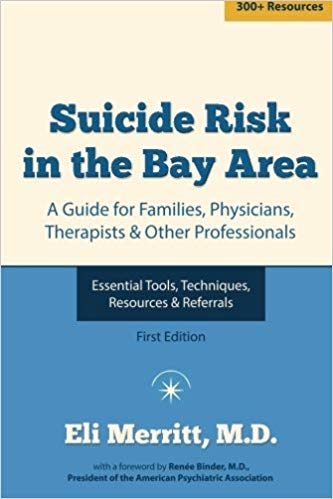 Eli Merritt, M.D., is the founder of Merritt Mental Health, a mental health and addiction care navigation company that connects patients and family members with best-fit, individualized mental health care nationwide. He is the author of Suicide Risk in the Bay Area: A Guide for Families, Physicians, Therapists, and Other Professionals, and is currently a Visiting Scholar at Vanderbilt University where he is investigating a Unified Theory of Depression. Dr Merritt has previously held positions as president of the San Francisco Psychiatric Society and as an Adjunct Clinical Faculty member at Stanford. He completed a B.A. in history at Yale, M.A. in ethics at Yale, medical degree at Case Western Reserve, medical internship at the Lahey Clinic, and residency in psychiatry at Stanford. He has written on diverse topics in medicine, psychiatry, and medical ethics, including diagnosis, insomnia and depression, addiction, suicide prevention, informed consent, and privacy issues in mental illness. He has taught medical students and resident physicians courses on psychiatric interviewing, ethical standards and boundary violations, the placebo effect, hyperthyroidism, and medical decision-making, among other subjects.
Eli Merritt, M.D., is the founder of Merritt Mental Health, a mental health and addiction care navigation company that connects patients and family members with best-fit, individualized mental health care nationwide. He is the author of Suicide Risk in the Bay Area: A Guide for Families, Physicians, Therapists, and Other Professionals, and is currently a Visiting Scholar at Vanderbilt University where he is investigating a Unified Theory of Depression. Dr Merritt has previously held positions as president of the San Francisco Psychiatric Society and as an Adjunct Clinical Faculty member at Stanford. He completed a B.A. in history at Yale, M.A. in ethics at Yale, medical degree at Case Western Reserve, medical internship at the Lahey Clinic, and residency in psychiatry at Stanford. He has written on diverse topics in medicine, psychiatry, and medical ethics, including diagnosis, insomnia and depression, addiction, suicide prevention, informed consent, and privacy issues in mental illness. He has taught medical students and resident physicians courses on psychiatric interviewing, ethical standards and boundary violations, the placebo effect, hyperthyroidism, and medical decision-making, among other subjects.
Esme Shaller, Ph.D., is an Associate Clinical Professor in the Department of Child Psychiatry at UC San Francisco and in the Department of Psychology at UC Berkeley. She is the director of the Dialectical Behavior Therapy Program at UCSF and the Clinical Director of Outpatient Services for Child Psychiatry. Dr. Shaller’s passion lies in the teaching and dissemination of empirically supported treatments for complex psychological problems, particularly in adolescence. As such, she devotes a large percentage of her time to teaching and training, both within UCSF’s residency and fellowship programs and in the larger Bay Area community. She has worked with other members of her team to implement comprehensive DBT for low income teens in three California Counties. Dr. Shaller received her B.A. in psychology with highest honors from UC Berkeley and her Ph.D. in clinical psychology from the State University of New York, Stony Brook. Subsequently, she completed her psychology internship at the Zucker Hillside Hospital at Long Island Jewish Medical Center in Queens (where she fell in love with DBT!), followed by a postdoctoral fellowship at Kaiser Permanente in South San Francisco. She has been at UCSF since 2007.
by Rona | Jul 20, 2018 | Announcements, Appearances, KPFA, Podcasts, Radio Shows

Listen to todays show I hosted on KPFA, 94.1FM, “About Health” 7/23/18
“Today, pesticide use is at an all-time high and these agrochemicals are finding their way into our livestock, agricultural industries, and ultimately, onto our plates.” —What’s Making Our Children Sick?
Did you know that Glyphosate herbicide has been found in popular cereals?
The Center for Environmental Health’s (CEH) independent testing of a variety of American cereals found many common brands of conventional products contained residue levels of the weed killer glyphosate. This toxic chemical has been shown to cause birth defects in laboratory animals and disrupt hormone function. Recently, the World Health Organization classified glyphosate as a “probable human carcinogen.”
Joining us for this important conversation is Carolyn Cox. Caroline leads The Center for Environmental Health‘s (CEH) research on toxic exposures, identifying, analyzing, and substantiating the scientific bases to eliminate threats to children and others exposed to dangerous chemicals in consumer products. She joined CEH after working on pesticide toxicity and alternatives to their use for over 15 years, and serves on the Board of Directors of Beyond Pesticides. She is passionate about protecting our world from toxic chemicals. Caroline has a master’s degree in entomology from Oregon State University
Also joining us is Michelle Perro, MD, a veteran pediatrician with over thirty-five years of experience in acute and integrative medicine. More than ten years ago, Dr. Perro transformed her clinical practice to include pesticide and health advocacy. She has both directed and worked as attending physician from New York’s Metropolitan Hospital to UCSF Benioff Children’s Hospital Oakland. Dr. Perro has managed her own business, Down to Earth Pediatrics. She is currently lecturing and consulting as well as working with Gordon Medical Associates, an integrative health center in Northern California. She is the co-author of “What’s Making our Children Sick?”
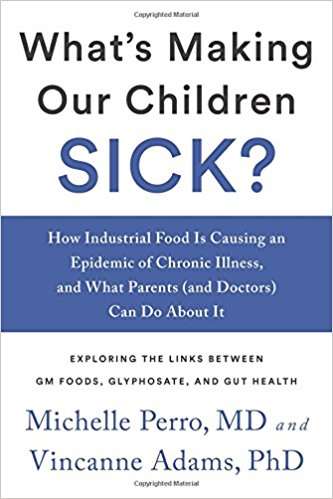
by Rona | May 24, 2018 | Announcements, Appearances, KPFA, Podcasts, Radio Shows
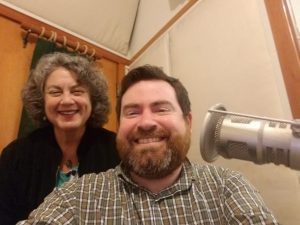 David B. Feldman joined me on “About Health” on KPFA.org for a discussion about people who experience physical trauma and the aftermath of their experience. Why do some people recover faster? And how can a person’s attitude, outlook, and social support, make a difference?
David B. Feldman joined me on “About Health” on KPFA.org for a discussion about people who experience physical trauma and the aftermath of their experience. Why do some people recover faster? And how can a person’s attitude, outlook, and social support, make a difference?
David B. Feldman, PhD, is considered to be among the top experts on hope in the field of psychology. Professor and Chair of the Department of Counseling Psychology at Santa Clara University, his research and writings have addressed such topics as hope, meaning, and growth in the face of serious medical illness, trauma, and other highly stressful circumstances. He is the co-author of three books, including The End-of-Life Handbook: A Compassionate Guide to Connecting with and Caring for a Dying Loved One, and Supersurvivors: The Surprising Link Between Suffering & Success. His research has been published in numerous scientific journals as well as in popular publications. He has appeared in such magazines as SELF, People, ‘O’: The Oprah Magazine, U.S. News & World Report, and Harvard Business Review, has been interviewed for national television and radio, and writes regularly for Psychology Today. In addition, he is the host of the podcast “Psychology in 10 Minutes,” which can be found at www.psychologyin10minutes.com or on any podcast app. More information about Dr. Feldman can be found at www.davidfeldmanphd.com.
by Rona | May 18, 2018 | Announcements, Appearances, KPFA, Podcasts, Radio Shows
Learn about Brain-Changing Practices for Release from Fear, Panic, and Worry
“About Health” on 94.1FM KPFA.org
Listen here: https://kpfa.org/player/?audio=285641
This was a fund raising show that aired on May 21, 2018
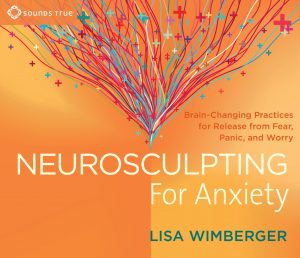
(Picture from Outdoor Afro)








 David B. Feldman joined me on “About Health” on KPFA.org for a discussion about people who experience physical trauma and the aftermath of their experience. Why do some people recover faster? And how can a person’s attitude, outlook, and social support, make a difference?
David B. Feldman joined me on “About Health” on KPFA.org for a discussion about people who experience physical trauma and the aftermath of their experience. Why do some people recover faster? And how can a person’s attitude, outlook, and social support, make a difference?